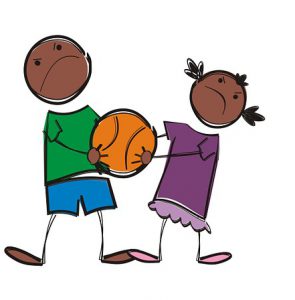 Arguments between siblings are inevitable. The question many parents face, is how to best handle the situation?
Arguments between siblings are inevitable. The question many parents face, is how to best handle the situation?
I’m sharing one recent instance that unfolded in my own house in hopes of helping some of you in search of that very answer — also to show you that it can be done in a way that respects both parties and sets a foundation for growth in all involved:
Last night, we had our most violent sibling-on-sibling encounter yet. I’m sure many of you reading this can relate to that mama/papa bear instinct when you see one of your babies being hurt, even when it’s by one of your other babies. That instinct to protect our young is so strong that we may sometimes lash out on one of our own children in defense of another.
Well, last night, we were heading up to bed late. Everyone was exhausted. Everyone was dysregulated. We had been out of town for 4 days, and there were many potential triggers in play that I was well aware of. My goal was to get everyone up to bed as quickly and calmly as possible before someone — and then inevitably everyone — fell apart.
My oldest two ran upstairs to brush their teeth while I brought the baby and my husband grabbed our bags. The boys had been bickering back and forth and getting in each other’s space the entire way up the stairs. I had requested that they each give the other some breathing room and focus on keeping themselves in control while we prepare for bed.
As my husband and I began walking upstairs, we heard it. The scream that alerts you that someone is very badly hurt. My second child ran out of the room crying so hard he couldn’t breathe. My husband sat down and wrapped him up in his arms. My son took a deep breath and screamed and screamed. My husband asked him what had happened. He told us that his brother had hurt him.
With my second son securely being comforted in the arms of his daddy, I calmly and quietly walked into the bedroom, and just as calmly and quietly called out to my oldest son. He slowly walked out of the closet with his head down. I asked him what had happened and he said, “Mommy, I got so angry. I forgot to walk away.”
“I see.” I replied. “Your brother seems very hurt and upset. What do you think we should do now?”
He responded that we should go and check on him and see if there was anything he could do to help. However, once he walked up to his brother and asked, my second son screamed “no” at him and told him to go away. My oldest took this hard and ran back into the bedroom clearly upset. I followed him. He angrily told me that he was never doing that again. I explained to him that, while he felt calmer and ready to help, his brother was not yet calm and ready to accept that help.
My husband and I began getting everyone ready for bed. While he was helping my middle son into his pajamas, I looked over to see 4 very dark red, bloody streaks down at least half of his back. It literally took my breath away. Until this point, we had not known the offense or the extent of it. This truly looked like wolverine had attacked him. I had to take a gigantic deep breath and settle down that mama bear within me. I told my husband to look on his back. He looked back at me with eyes wide open.
My oldest son said, “I wonder how he got those marks on his back.”
“Your hands made those marks on his back,” I calmly responded.
He looked down at his hands turning them over and examining them, “I must have really sharp nails.”
“Yes,” I said, “and you have very strong hands.”
He looked at me for a moment. I told him, “It’s a great thing to have very strong hands like yours. But they are to be used for good things, like carrying heavy grocery bags in from the car, or holding heavy doors open so others may walk through. They should not be used to hurt others. The next time you feel so angry, I want you to walk away. When you feel so angry that you want to explode, you can go and scratch the pillow, or the mattress, or pound your fists into the ground. But you cannot hurt someone else.”
“I will try, Mommy,” he said. “It is very hard. But I will try.”
“I know you will,” I told him, “because you are not a bad person. And you are not a mean person. You are a very kind boy with a very loving heart. And because of that, the next time you are so angry, you will remember to walk away.”
I could see the internal thoughts racing across his eyes. I could see his mind doubting, but I could also see his heart believing. And then, his body softened. At that moment, I knew he fully embraced that he is a loving and kind person — that his actions do not define him, that he is in fact capable of self-control…and of fixing things when he makes a mistake.
 So often, whether because of our parental bear inside or because we are responding in the way we think we are supposed to, we yell, blame, and punish in these situations. However, what current brain research tells us is that this does zero good, but actually a great deal of harm.
So often, whether because of our parental bear inside or because we are responding in the way we think we are supposed to, we yell, blame, and punish in these situations. However, what current brain research tells us is that this does zero good, but actually a great deal of harm.
You see, children do not choose these emotions or the reactions to their emotions. They aren’t developmentally capable. And if you question this, I ask you: Have you ever felt so angry that you thought you were going to snap? Or maybe you did. Maybe you punched a hole in the wall or threw something across the room or lashed out in anger screaming profanities or insults at those around you. Looking back, did you choose to feel that angry? Did you choose to lose complete control of yourself? Or did it come upon you like a sudden tidal wave and crash into you before you could realize what was happening?
Children’s brains are far less developed than ours. The prefrontal cortex is not fully developed until the mid-20s! These emotions are not at all conscious on their part and actually are very frightening and overwhelming to children. They need our loving guidance and support in these moments, not an iron fist. When we come down on children in these moments, their brains interpret these emotions as unacceptable and bad.
They then internalize the idea that they, too, are shameful and bad people…and that when they have these feelings — of which they are not in control of and do not know what to do with — that they are not worthy of love. This is the last thing I wanted my son to think of himself. What good was that going to do? I’m not trying to raise a bitter and resentful adult whom feels unworthy. I am working to develop a kind and loving one.
Related: The Attached Family’s “Parenting Without Shame” issue
Is it permissive what I did? Do you wonder, how is he going to learn anything from this without punishment? Looking back on my example, you can see very clearly that I made it known that it is OK to feel angry and that there are appropriate ways for us to express and expel our anger, but I also made it very clear that it is never OK to hurt someone else in the process.
This way, my son was able to internalize the idea that he is indeed a kind and loving person, and he can therefore feel empowered to make a better decision the next time these feelings present themselves. He also is now equipped with tools to assist him in making a better decision next time. He now has other ideas of what he can do with his anger that won’t result in someone being hurt — mentally, emotionally, or physically.
Based upon his responses, both verbal and nonverbal, it’s clear to see that he felt terrible about what he had done. It was not his intent to harm his brother. He received a natural consequence — he felt what is called natural or healthy guilt. This is very different from shame. Have you ever felt very badly about something you had done? That is natural guilt. It is not taught — it is developed through the brain and the conscience. This internal guilt he felt is enough of a consequence for him. It is also going to be the driving force in helping him make better choices in the future. But in order for it to come through, he has to feel my unconditional love and calm presence supporting him through this difficult time.
Before we finished up, I said to my oldest son: “Now that your brother has calmed down, it may be a good time to try and talk to him about it again.”
I could see the hesitation on my son’s face — which could have been that he needed some more time to process what we had talked about, or it could have been nervousness of being rejected again. Either way, I quickly reassured him: “When you are ready. Listen to your body, it will tell you when you are ready to talk with your brother. And I am right here to help you if you need it.”
Sometimes, especially in kids over the age of 5, children need some time and space to process the event as well as their feelings surrounding it. It’s very important that we give them this space and time.
I observed their play throughout this morning. This afternoon, I found an opportunity to approach my oldest and ask him if he had a chance yet to talk with his brother about last night. He told me that he had, though I knew it hadn’t yet come up. I waited. About 5 minutes later, he went to his younger brother and asked if he could see the scratch marks from the night before. Consent was granted, so I helped lift up his shirt. My oldest son commented on how they were healing but the fact that they were still there.
The two of them then launched into an entire recount of the event ending with my oldest son saying, while making a scratching motion, “And I did this and that was not OK.”
His younger brother responded with, “Yeah. You hurt me. That was not OK.”
“I’m really sorry,” my oldest son said. It was genuine, and his younger brother knew it.
That was the end of it. Off they ran to play. All fear, anger, and sadness lifted; the relationship renewed and restored; and both kids with a bigger heart and deeper connection than what existed the previous day.
